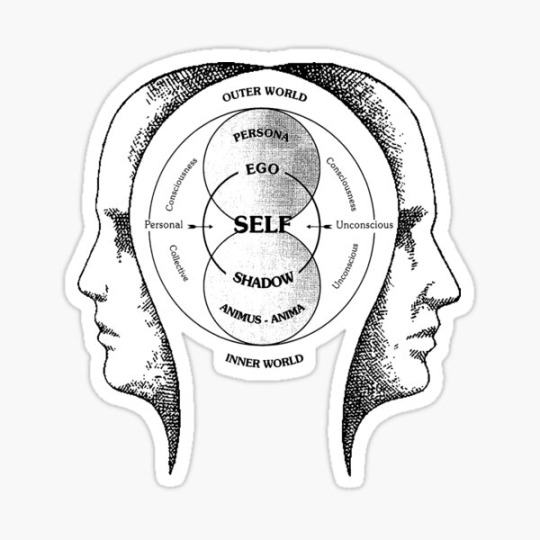Text
The transcendental self.
The transcendental self could be said to be Jung's "Self" and this is because it cannot be suppressed in any way, in the same way that it is impossible to limit the visual field, even if you close your eyelids, it will still be there. Perhaps this is why, in the same way that most people do not want to face their shadow, they also do not want to keep their eyelids closed for long (while conscious) because this leads directly to their self-consciousness, since by perceiving a "unique" stimulus created by them they realise that they are them (comparable to the for itself moment of the Hegelian dialectic) and that they therefore risk facing their inner demons that dwell on the shores of their consciousness. Similarly, a painter who usually paints with a palette of several colours, when he is left with only one colour, becomes depressed because doing so reminds him of the absence of the other colours, so he rushes to buy the rest of the missing colours.

Now, I know that I use the term "transcendental self" a lot and that the discerning reader will have realised that I have not yet given an explanation of what it is, so for him it will simply be a dead sign or straightforward nonsense. In order to avoid misunderstandings, I will proceed to explain roughly what this transcendental self is, I say roughly because the further I go into the definition itself using words the more likely I am to start talking nonsense, in the same way that a submarine in the depths feels the pressure exerted by the water as it goes down.
The "transcendental self" is to the self what a chess player is to a piece on the chessboard, so that the piece has some assigned moves it is able to make on the board, but it is not the piece itself that moves, but rather a somewhat external agent that causes it to move, so that it is in turn conditioned by this player, but on the other hand, this player is the one that allows it to move.
Having said this, let's suppose that the piece is capable of having representations within the limits of the board, of course, it will now be able to observe it and know the position in which it is, however as time goes by it moves around the board believing that these movements are provoked by it, this after all it believes this because it sees someone, namely itself occupying a space. So far so good, but when someone asks a question along the lines of "why is the piece moving instead of being static" we will see that behind this unknown lies the transcendental subject.
Most people don't tend to focus much on this transcendental self, as most of them are too much focused on the puppet theatre than on who makes the puppets move.
0 notes
Text
“When I came home I expected a surprise and there was no surprise for me, so of course, I was surprised.”
― Ludwig Wittgenstein
5 notes
·
View notes
Text
A short reflection on the noumena.
To think about the properties of the noumena, that is, that it can be named, known indirectly, that it cannot be represented, etc… Is something really strange, that is to say, everything, absolutely everything we perceive is a phenomenon, so our thoughts are also phenomena, since they come from experience, the strange thing is that in order to affirm the existence of the noumena, my knowledge of the noumena (for example, of its properties) keeps in itself an x, since this knowledge I only have it at the level of phenomenon, in fact, the knowledge of this x keeps in itself another x, and so on ad infinitum.

It is similar to the situation of a person who is surrounded by darkness and is not able to tell what is behind it, even though his field of vision encompasses what is behind it, he is not able to perceive it. Perhaps that thing we do not perceive is the noumena and our visual field is the noumenal part of our knowledge.
1 note
·
View note